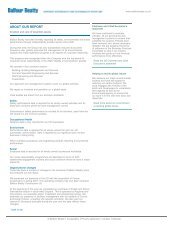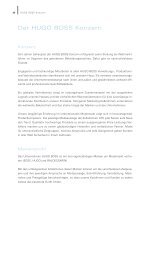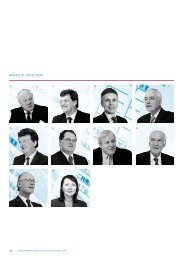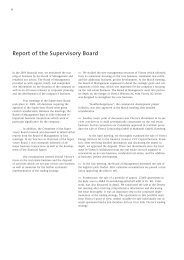E_mg_GB_03_vorne-29_3_04
E_mg_GB_03_vorne-29_3_04
E_mg_GB_03_vorne-29_3_04
Create successful ePaper yourself
Turn your PDF publications into a flip-book with our unique Google optimized e-Paper software.
68<br />
Lurgi’s business in 20<strong>03</strong> was hit by the depressed levels of capital spending around the world and in<br />
Europe in particular. The only exceptions here were the growing markets of China and the Middle<br />
East. The plant engineering sector was characterized by intense competition for markets and the<br />
extremely high pressure on costs exerted by customers. Investor structures, particularly for large-scale<br />
projects, produced complex and long-term contractual and funding models. The strength of the euro<br />
compounded the situation in Germany’s export-driven industrial plant engineering sector. Taken<br />
together, these factors delayed the awarding of large-scale projects expected in 20<strong>03</strong>.<br />
As part of the restructuring program launched by the <strong>mg</strong> Group, Lurgi started to implement the first<br />
of these measures towards the end of 20<strong>03</strong>, and commenced the process of winding up its holding<br />
company. In 20<strong>04</strong>, Lurgi Oel Gas Chemie GmbH and Lurgi Life Science GmbH will be merged with<br />
Lurgi AG, which will then be an operating company. The aim of this measure was to improve efficiency<br />
and generate cost savings over the foreseeable future. Lurgi started to close down the Chemnitz site<br />
of Lurgi Life Science GmbH in line with the <strong>mg</strong> Group’s strategy of disposing of businesses that fail<br />
to achieve sustainable profitability. It is currently examining alternative options that would secure<br />
these jobs. Its restructuring costs affected its profits accordingly. Further one-off charges were taken<br />
as a result of necessary valuation allowances on inventories.<br />
In the future, Lurgi will concentrate on technologies such as gas-to-petrochemicals and synthetic<br />
fuels, sulfur management, exclusive licensing agreements in the field of petrochemicals, as well as<br />
food, oleochemicals, and fuels and fuel components made from renewable resources such as bio-diesel<br />
and bio-ethanol. Its gas-to-petrochemicals business – focusing on synthesis gas, MegaMethanol®,<br />
methanol-to-propylene (MTP®), Megammonia®, methanol-to-synthetic-fuels and sulfur management –<br />
is largely based on proprietary technologies. Over the past ten years Lurgi has established itself as<br />
the market leader in methanol: between 60 and 70 percent of global methanol production either<br />
already comes from Lurgi’s plant or will do so in the near future. As part of its strategy of focusing<br />
on growth markets, Lurgi plans to dispose of its refinery technology, fine chemicals, and pharmaceuticals<br />
businesses.<br />
The Oil Gas Chemicals strategic business unit won a smaller volume of new orders due to delays in<br />
the awarding of big-ticket projects. During the period under review, this unit won its first contract in<br />
the field of Eastman polymer-grade terephthalic acid (EPTA) technology, which is being developed<br />
jointly with Eastman. Terephthalic acid is an important intermediate in the production of polyester.<br />
In Iran a Letter of Award was signed for a further MegaMethanol plant®. The order for this plant is<br />
expected in the first half of 20<strong>04</strong>. This unit’s earnings were depressed by problems with two major<br />
contracts. This deterioration in its profits was caused by additional charges and follow-up costs<br />
incurred by a strike and disruptions lasting several months as well as inefficient working by plantassembly<br />
firms. Its profitability was also hit by insufficient capacity utilization.









